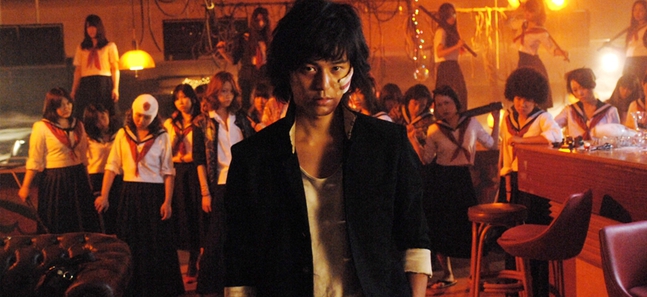Ai to Makoto (The Legend of Love & Sincerity)
Takashi Miike’s musical is ‘West Side Story’ meets ‘Crows Zero’ – just less so

© 2012『愛と誠』製作委員会
Posted: Fri May 18 2012
Director: Takashi Miike
Starring: Satoshi Tsumabuki, Emi Takei, Takumi Saito
Time Out rating: 
After drifting disconcertingly close to mainstream respectability with his recent forays into samurai cinema, 13 Assassins and Hara-Kiri, Takashi Miike is up to his old tricks again in Ai to Makoto. Transforming Ikki Kajiwara's 1970s manga series into a violent high-school musical, the director aims for a hybrid of West Side Story and his own Crows Zero films, though the resulting mess is more likely to satisfy fans of the latter than the former.
There's precious little chemistry in this tale of star-crossed lovers: pure-hearted rich kid Ai (Emi Takei) and Makoto (Satoshi Tsumabuki), the scarred delinquent who's constantly shucking her affections. After a ski-slope collision seals their fate as children – told in a cutesy anime sequence that opens the film – the pair are reunited in Tokyo in 1972, where Ai vows to turn her beloved's broken life around. It's a mission that leads her from her posh private college to a seedy kissa club and rundown inner-city school, where we meet a cast including Sakura Ando's gum-chewing skank Gumko, impassive ice queen Yuki (Ito Ono), and a quiff-sporting Tsuyoshi Ihara as Makoto's nemesis, Gonta.
And there are songs! Which is part of the problem, actually: from the first big number, it becomes clear that Miike hasn't invested nearly as much time in coordinating his musical routines as in the fight scenes that come to dominate the film later on. Ai to Makoto's score of Showa-era pop hits and retro-styled originals by Takeshi Kobayashi (Kill Bill) is wasted in a series of sequences that appear to have been choreographed in about 20 minutes each. Whatever spontaneity Miike was hoping to capture in these hurriedly shot setpieces is overshadowed by their sheer, grinding amateurishness – further compounded by an audio mix that leaves the characters sounding like they're singing from the bottom of a well.
Only Ihara's ensemble dance routine ever gets close to the kind of bonkers, Bollywood excess that Ai to Makoto really needed; otherwise, it hovers closer to the level of an am-dram rehearsal. Given the enthusiasm with which Miike has embraced and subverted other genres in the past, his half-heartedness here feels frustrating: why even bother doing a musical if you're going to do it so badly? And while this is hardly the first of his films to vacillate wildly in tone, the shift from cartoonish excess to melodrama in the final reel never achieves the kind of emotional payoff that he seems to crave. He should've just ended on a big chorus number instead: that normally does the trick.
Ai to Makoto opens nationwide on June 16
Tweets
- About Us |
- Work for Time Out |
- Send us info |
- Advertising |
- Mobile edition |
- Terms & Conditions |
- Privacy policy |
- Contact Us
Copyright © 2014 Time Out Tokyo














Add your comment